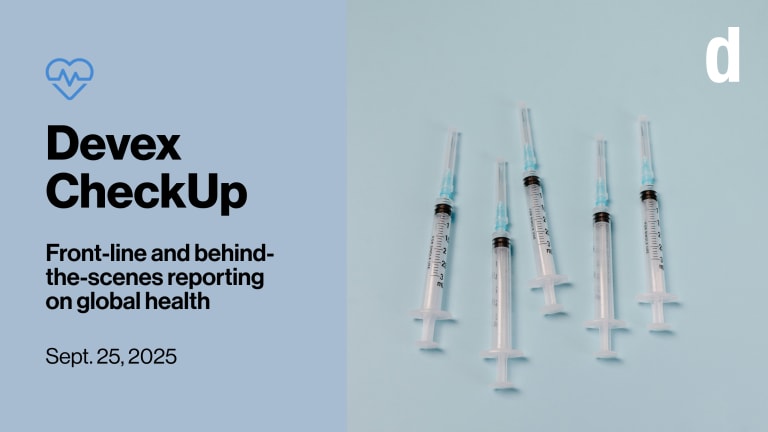
This week, the United Nations launched its biggest funding request ever for a single country, asking for nearly $5 billion to help 22 million people in Afghanistan — more than half the country’s population — who are facing acute hunger, as well as hundreds of thousands of displaced Afghans in neighboring countries.
Among the most urgent needs are health and hunger, says Martin Griffiths, undersecretary-general for humanitarian affairs and emergency relief coordinator.
This is a preview of Devex CheckUp
Sign up to this newsletter for exclusive global health news and insider insights, in your inbox every Thursday.
• The health system in Afghanistan is on the “brink of collapse,” WHO chief Dr. Tedros Adhanom Ghebreyesus warned in September. But the situation has worsened since then due to a lack of funding and a severe banking crisis.
• The almost $5 billion ask will go to 160 groups delivering aid. Some will be used to pay health care staffers and other front-line workers directly — and not via the Taliban — Griffiths says.
• According to the International Rescue Committee, “most health clinics have closed and the economy has spiraled downward … as the country confronts an ongoing drought and hunger crisis and possible fourth wave of COVID-19.”
• Some organizations that rely on private funding, such as Médecins Sans Frontières, have been able to keep their programs going but warn that the banking crisis will have dire consequences for operations.
• Manuel Bessler, head of the Swiss Humanitarian Aid Unit, has also raised concerns about development funding being cut off, urging donors to adopt the “famous nexus approach” between humanitarian and development efforts to support long-term outcomes in the country. “Humanitarian aid alone is not sufficient. … It does not prevent the collapse of the central public services like health … [and] the economy, and it cannot strengthen the resilience of the population,” he says.
To mandate or not to mandate
• Countries such as Malawi, Ghana, and Zimbabwe have introduced mandatory vaccination for public sector employees such as teachers, front-line workers, and journalists in order to prevent further spread of COVID-19.
• Though some public health experts say the measures may be necessary to increase vaccine uptake, WHO and some civil rights groups are against it. Civil rights advocates argue that mandatory vaccination is a human rights violation and that governments should instead continue to educate citizens on the benefits of vaccination.
• The Centre for Democracy and Economic Development Initiatives in Malawi took the government to court in a bid to reverse the mandates but the case was dismissed with costs. Opposition to vaccine mandates in the continent is not new. Last year, public backlash forced Zambian authorities to reverse a proposed mandatory vaccination policy for civil servants.
• On a continent where just a little over 10% of the population is fully vaccinated, the decision to make it compulsory is a tricky one. According to Dr. John Nkengasong, director of the Africa Centres for Disease Control and Prevention, the mandates could be necessary if people don’t voluntarily get vaccinated. "I don't know of any country now in Africa that if people wanted to get vaccinated they would not get a vaccine," he says. "My advice to the population of the continent is 'go and get vaccinated' so that it becomes unnecessary ... for governments to impose mandatory vaccines."
Read: Are COVID-19 vaccine mandates the next step for African countries?
No confidence
“Do you think the world will come together to get ready for the next … [pandemic]? I hope so but I am not sure.”
— Billionaire philanthropist Bill GatesOn Tuesday, Gates took part in a Twitter chat with Devi Sridhar, a public health researcher at the University of Edinburgh, to discuss COVID-19 and other development topics. Read the full conversation.
Will 2022 be the year of TRIPS?
The global standoff to waive IP rights for COVID-19-related vaccines, treatments, and products continues in the new year. In December 2021, India — one of the original proponents of the waiver — requested a virtual ministerial meeting to discuss the World Trade Organization’s pandemic response, including the TRIPS waiver. But the European Commission has since dismissed that proposal as “premature,” Andrew Green reports.
Read: TRIPS standoff continues in the new year
Still, a new hope is present: Germany's new government might help shift the EU's position on TRIPS.
Wellcome numbers
£38.2 billion
—That was the size of Wellcome’s investment portfolio in the fiscal year to September 2021 — an increase of more than a third. It now plans to spend £16 billion ($22 billion) over the next decade on mental health, infectious diseases, and the health impacts of climate change, according to its new funding strategy.
Devex Pro: Wellcome announces $22B funding strategy
Gender vendors
Startups focusing on women’s health tech are tapping a growing market with the potential to reach nearly $10 billion by 2024, says Makhtar Diop, managing director at the International Finance Corporation.
Women have unique health care needs that extend far beyond pregnancy and fertility — which are often the focus of many entrepreneurs and investors. For example, cardiovascular and other conditions can present differently between sexes.
New year, new job?
Epidemiologist
Coalition for Epidemic Preparedness Innovations
Norway | United Kingdom
Sign up for a free trial of Devex Pro to search the latest job postings in global health, plus get access to all our news and analysis, exclusive events and in-depth special reports.
But the women’s health tech market still faces obstacles ranging from the underrepresentation of women in studies to the stigmatization of women’s health conditions. The landscape is even more challenging in low-resource settings, but some organizations are working toward changing that.
Lindsey Simmonds, co-founder and CEO at Intrepid Entrepreneurs, runs the Next Health Accelerator program to support women-focused health tech startups in Africa. She suggests that things are looking up for health tech globally. “I have every reason to believe women are taking health into their own hands and creating their own solutions,” she says.
Read: How technology can revolutionize women's health care
One challenge faced by the digital health sphere is scalability, with critics pointing out that sometimes it seems like a lot of pilots go nowhere. Some solutions, Catherine Cheney reports, include a complete focus on user needs, an eye for hidden costs, and the willingness to focus on failure — specifically, by examining pilots that didn’t work alongside those that did.
Read: What will it take to bring digital health solutions to scale?
What we’re reading
Is WHO’s new pandemic hub in Germany all show and no substance? [Foreign Policy]
Undocumented Afghan asylum-seekers and migrants in Turkey are unable to get treatment and vaccines against COVID-19. [VOA]
India’s inadequate system of reporting adverse events is leaving communities distrustful of COVID-19 vaccines. [The BMJ]










